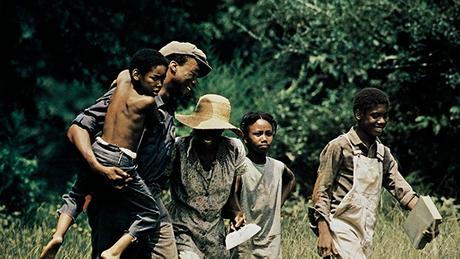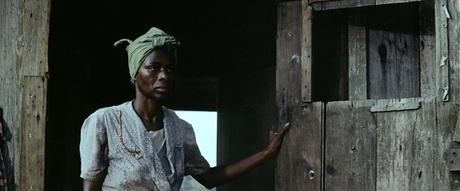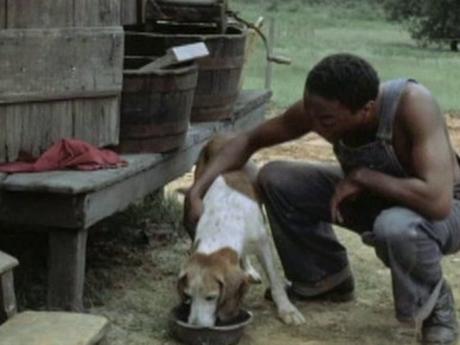Retro Review: 'Sounder'

The month of February in the United States is recognized as Black History Month. This is to honor the rich history of struggles and triumphs African Americans have gone through, as well as to acknowledge the work left to do. In honor of Black History Month I have decided to focus my Retro Reviews for the month on important films of black cinema. I have heard many historians I respect refer to the 70's as a Second Harlem Renaissance, when once again black culture flourished in all forms of art and media. This included film as cool low budget horror, action, and films prominently featured African Americans both in front of and often behind the camera for what was dubbed "blaxpoitation". It was during this trend that screenwriter Lonne Elder III took a different approach from the mainstream. Adapting a novel from the same name, the 1972 film Sounder would be a heartfelt saga of a family trying to make it through trials and tribulations why staying together.
The film centers of David Lee, the oldest son of the Morgan's, a family of African American sharecroppers in Depression-era Louisiana. The family's patriarch Nathan Lee is arrested for stealing food to feed his family, leaving the responsibility of harvesting the crops for the season to his wife Rebecca and their children. With the help of a sympathetic white woman, David Lee learns where his father is incarcerated. With Sounder, the family dog by his side he treks out to visit his father and in the process meets the kind school teacher who encourages the young man to pursue his education. When Nathan Lee unexpectedly returns home, David Lee is given the go-ahead from his father to travel to school and get the education which will provide him a brighter future.
This is a film where not a lot happens in terms of action, but tons happens as a matter of heart. Everything revolves around a family with no food, no money, and held back simply because of the color of their skin. But they have each other and their love for one another will get them through. The importance each member of the Morgan family has to one another is perfectly clear throughout the film. When Sounder is hurt by a cruel sheriff's deputy, Nathan Lee excuses his running off as needing time to heal, but when David Lee runs off to find time to heal, we see his father go right after him no wanting his son to heal alone. Given that the film is told through the eyes of a kid gives Sounder a sense of wonder. In that regard, Kevin Hooks proves perfectly cast as David Lee. He shows a maturity of a young man who accepts his new role as man of the house, but still maintains a precocious child-like sense of innocence. He is just as willing to put aside his school work to help his mother harvest the crops, but still has fun chasing down racoons at with Sounder. This type of talent is rare among child actors and nails it every aspect of this complex role.

The entire cast of this movie is absolutely perfect in every way, but the emotional anchor to the ensemble is the recently departed Cicely Tyson in her career-making role. At 47 years old, Tyson was ready to leave the acting business because there seemed to be little in the way of parts for strong black women. Once she found Sounder, the actress knew this was the part she had been looking for. Cicely Tyson's channeling of the character of Rebecca is so complete it leads to a beautifully flawless performance. Even when she simply sitting silently worrying about her husband, or enduring patronizing lectures from the owner of the lands, the feelings, strengths and emotions of the character comes off of the screen and you can not help but feel it. Because her performance is so subdued for most of the film, the scene where Nathan Lee is seen walking down the path back home, her ecstatic joy is absolutely radiant. Cicely Tyson gives a true master class in acting in Sounder which demands to be seen.
The fact that Sounder was actually filmed in rural Louisiana brings a great deal of authenticity to the picture that it likely would not have had otherwise. Director Martin Ritt excellently captures the atmosphere of the region so much that you will swear you feel the humidity drifting from the screen and hitting you as the viewer. The wonderful score from Grammy winning blues musician Taj Mahal (who also plays Nathan Lee's friend Ike) could not have been a better fit for the film. His gruff but melodic finger-picking has an authenticity which adds to what is unfolding onscreen.

This truly is one of most important films of American cinema as Sounder broke down many color barriers in cinema. The performances of Cicely Tyson and Paul Winfield were so powerful that for the first time a film featured African American nominees for bother Best Actor and Best Actress at the Academy Awards. Given that Tyson was nominated alongside Diana Ross for Lady Sings the Blues, it became the first time two African-American women were up for the award. On the same award night Lonne Elder's script for Sounder earned him the honor of being the first African-American to be nominated for Best Adapted Screenplay. Trophies and gold aside, Sounder is a movie which once seen is never forgotten. It tells a simple story of a simple family in circumstances many viewers will have never seen. The film may have been set in 1933 but it maintains relevancy to this day. Director Martin Ritt and writer Lonne Elder III do not shy away from harsh and challenging subjects, but tackle them with a sense of hope and heart which should make Sounder mandatory viewing.

